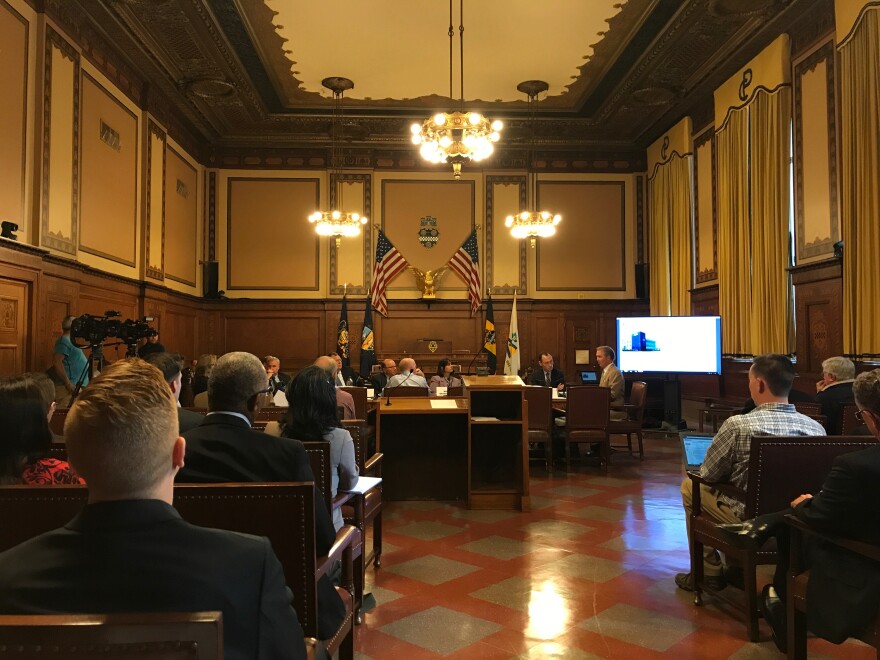At a public meeting Tuesday, officials from Tulsa, Okla. and Indianapolis, Ind. talked about the dramatic changes their city made to the provision of water and sewer services.
They presented to a mayoral panel tasked with deciding how best to address the systemic challenges facing Pittsburgh Water and Sewer Authority (PWSA): crumbling infrastructure and lead issues among them.
Tuesday’s meeting was the second of three presentations from consultant Infrastructure Management Group, Inc (IMG Inc), hired in April to evaluate PWSA. On Aug. 28, IMG Inc presented three broad options for PWSA: transfer (sell) the water and sewer assets to another entity; lease the assets to another entity, such as another utility or a nonprofit, over a 50-year period; or an internal restructuring of the organization.
Indianapolis is an example of a transfer: In 2011, it sold its then city-owned water and sewer assets to a nonprofit charitable trust called Citizens Energy Group, which already supplied the Indianapolis region with gas, electric, chilled water and steam.
Around the same time, Tulsa, Oklahoma undertook an internal improvement of the Tulsa Metropolitan Utility Authority (TMUA).
The two cities present very different models, and neither city began evaluating water and sewer services until they thought they could be monetized. By contrast, PWSA faces issues that prevent it from reliably providing clean water to residents.
Before the presentations began, the mayoral panel heard public comment. Reverend Dr. Vincent Kolb is pastor of Sixth Presbyterian Church, a member of the Our Water Campaign, which opposes any privatization of PWSA. Kolb said their campaign had no agenda besides protecting residents' health and safety.
“PWSA belongs to us and you are all accountable to us,” he said. “All of the faith traditions in [Pennsylvania Interfaith Impact Network] affirm that water is a gift from on high, and not a product to be commodified.”
Other speakers opposed privatization, and demanded that PWSA provide clean, safe drinking water. Allegheny County Controller Chelsa Wagner said the issues at hand were water, finances, and pipes. “Frankly, this really isn’t rocket science,” she said, adding that the options for PWSA missed the most obvious solution: leadership from the city.
“The challenges that utility systems across the country face are fairly consistent,” said Lauren Brookey, a TMUA board member. “Aging infrastructure, lack of sources of revenue to replace that infrastructure.”
But the structure of water and sewer utilities determines how ratepayers will be affected in the process of fixing that aging infrastructure. Rates are going to increase in order to take care of decades of deferred maintenance, but both the Tulsa and Indianapolis representatives talked about how their organizations mitigate that rise.
Citizens Energy Group provides most utilities to Indianapolis residents, so the organization tries to be mindful of “how much of a household’s income,” goes to Citizens, said Dan Evans, president of the board of trustees. Core services such as customer service and accounts receivable are also shared across Citzens' utilities, said Evans, thereby saving money. Their customer base is also larger than PWSA, which spreads out costs. The organization’s for-profit arm also helps low-income families with their costs.
The TMUA can generate revenue through the sale of water to municipalities beyond Tulsa. Institution of an asset monitoring system, a clear business plan, and a detailed strategic plan allows the authority to identify critical investment, and defer projects that aren’t immediately necessary in order to prevent the acquisition of unnecessary debt.
Both Brookey and Evans said the political nature of a utility’s leadership, or lack thereof, is important.
Citizens Energy Group is governed by a board of trustees which chooses a board of directors responsible for the utilities’ performance. Both groups are apolitical, said Evans.
“Politics do not play a role in our decisions, trust law [which governs public trusts] does. Which means we have to remain constantly focused on our purpose, which is to return all benefit to the inhabitants of Marion County,” where Indianapolis is located.
Tulsa’s mayor sits on the TMUA board, and appoints board members to seven-year terms. Besides the mayor, the board comprises three Republicans and three Democrats to oversee operations. However, water and sewer rates are approved by city council.
“Our customers ask the question, ‘You’re not elected, so why should you be making these decisions on our behalf?’” said Brookey. “And my argument would be that you do not want me elected. You want me to represent you as if I were a customer, as if I was drinking that water, not as if I had to be re-elected in the future.”
In an initial assessment of PWSA’s finances, a member of IMG Inc’s team, Tony Hernandez, found that the authority struggles with significant constraints: one person is responsible for the capital budgeting; just three of eight IT positions are filled; Hernandez said procurement controls, to prevent fraudulent payouts to vendors, are manual instead of automated.
Financial controls are manual because PWSA is short-staffed, said spokesperson Will Pickering, but the organization has received clean audits.
Pittsburgh city officials said they are working with IMG Inc to schedule community meetings before the consultant’s final presentation on Nov. 8.




